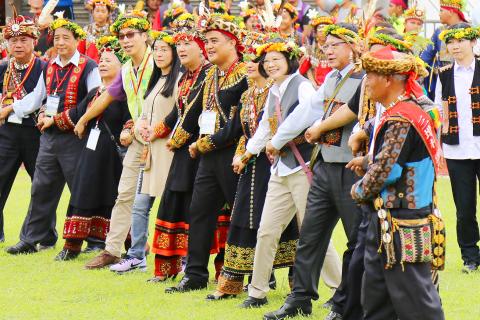President Tsai Ing-wen’s (蔡英文) approval rating has dipped below 50 percent for the first time since she was sworn in on May 20, with her disapproval rating increasing to almost 40 percent, according to a poll published by the Taiwan Indicators Survey Research yesterday.
The poll, conducted on Thursday and Friday among people aged 20 and above, found that the percentage of people who expressed satisfaction with Tsai’s performance has declined from 50.2 percent in late May and 54.6 percent in late June to 45.5 percent.
Her disapproval rating rose from 32.3 percent in last month’s poll to 39.8 percent.

Photo: Chiu Chih-jou, Taipei Times
When Tsai was sworn in, only 16.3 percent of respondents said they were dissatisfied with her performance, the poll said.
Asked if they have confidence in Tsai, 49.2 percent of those polled said “yes,” a drop of about 10 percentage points from 59.3 percent in the May survey.
The percentage of respondents who do not have confidence in her rose from 20.5 percent to 32.5 percent.
Premier Lin Chuan’s (林全) disapproval rating surpassed his approval rating for the first time, at 40.4 percent and 37.3 percent respectively, the poll showed.
Lin’s disapproval rating in the May survey was 17.4 percent, while 44.8 percent of respondents approved of his performance.
The survey indicated that respondents are divided on the performances of Democratic Progressive Party (DPP) lawmakers, who hold 68 of the legislature’s 113 seats.
Forty percent of respondents said DPP lawmakers’ performance was satisfactory, while 44 percent said otherwise.
Despite the numbers, the public seems to be more satisfied with the general performance of the Tsai administration than they were with former president Ma Ying-jeou’s (馬英九) government after its first three months in office in 2008.
The research center also compared its latest poll results with a survey conducted by the Chinese-language monthly Global Views between Aug. 12 and Aug. 15, 2008, to gauge public evaluations of the Ma administration’s performance.
In 2008, 47.6 percent of respondents were dissatisfied with Ma’s performance, while 36.1 percent said they were satisfied.
The approval and disapproval ratings for Ma’s first premier, Liu Chao-shiuan (劉兆玄), were 34.2 percent and 45.9 percent respectively, according to that poll.
Respondents to the magazine’s poll were unhappy with Chinese Nationalist Party (KMT) legislators, who occupied 81 seats in 2008, with about 54 percent of those surveyed saying they were not content with the lawmakers’ performance, while 26.3 percent approved.
The poll released yesterday collected 1,003 valid samples and has a margin of error of 3.1 percentage points.

Tropical Storm Gaemi strengthened into a typhoon at 2pm yesterday, and could make landfall in Yilan County tomorrow, the Central Weather Administration (CWA) said yesterday. The agency was scheduled to issue a sea warning at 11:30pm yesterday, and could issue a land warning later today. Gaemi was moving north-northwest at 4kph, carrying maximum sustained winds near its center of up to 118.8kph and gusts of 154.8kph. The circumference is forecast to reach eastern Taiwan tomorrow morning, with the center making landfall in Yilan County later that night before departing from the north coast, CWA weather forecaster Kuan Shin-ping (官欣平) said yesterday. Uncertainty remains and

SEA WARNING LIKELY: The storm, named Gaemi, could become a moderate typhoon on Wednesday or Thursday, with the Taipei City Government preparing for flooding A tropical depression east of the Philippines developed into a tropical storm named Gaemi at 2pm yesterday, and was moving toward eastern Taiwan, the Central Weather Administration (CWA) said. Gaemi could begin to affect Taiwan proper on Tuesday, lasting until Friday, and could develop into a moderate typhoon on Wednesday or Thursday, it said. A sea warning for Gaemi could be issued as early as Tuesday morning, it added. Gaemi, the third tropical storm in the Pacific Ocean this typhoon season, is projected to begin moving northwest today, and be closest to Taiwan on Wednesday or Thursday, the agency said. Today, there would likely

DISRUPTIONS: The high-speed rail is to operate as normal, while several airlines either canceled flights or announced early departures or late arrivals Schools and offices in 15 cities and counties are to be closed today due to Typhoon Gaemi, local governments announced last night. The 15 are: Taipei, New Taipei City, Taoyuan, Tainan, Keelung, Hsinchu and Kaohsiung, as well as Yilan, Hualien, Hsinchu, Miaoli, Chiayi, Pingtung, Penghu and Lienchiang counties. People should brace for torrential rainfall brought by the storm, with its center forecast to make landfall on the east coast between tonight and tomorrow morning, the Central Weather Administration (CWA) said. The agency issued a sea warning for the typhoon at 11:30pm on Monday, followed by a land warning at 11:30am yesterday. As of

CASUALTY: A 70-year-old woman was killed by a falling tree in Kaohsiung as the premier warned all government agencies to remain on high alert for the next 24 hours Schools and offices nationwide are to be closed for a second day today as Typhoon Gaemi crosses over the nation, bringing torrential rain and whipping winds. Gaemi was forecast to make landfall late last night. From Tuesday night, its outer band brought substantial rainfall and strong winds to the nation. As of 6:15pm last night, the typhoon’s center was 20km southeast of Hualien County, Central Weather Administration (CWA) data showed. It was moving at 19kph and had a radius of 250km. As of 3pm yesterday, one woman had died, while 58 people were injured, the Central Emergency Operation Center said. The 70-year-old